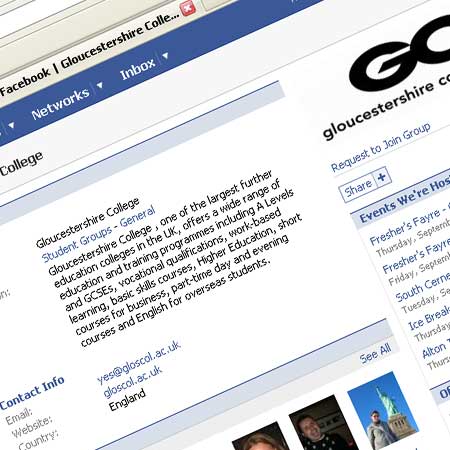This article from the Guardian made me smile.
There are many good reasons for not having your boss as a Facebook friend, and Sydney call centre worker Kyle Doyle has just discovered the most convincing of them all.
This article from the Guardian made me smile.
There are many good reasons for not having your boss as a Facebook friend, and Sydney call centre worker Kyle Doyle has just discovered the most convincing of them all.
So is blogging dead, is it no more?
Will Facebook, Twitter, Jaiku mean that people will no longer blog.
A Wired article says
Thinking about launching your own blog? Here’s some friendly advice: Don’t. And if you’ve already got one, pull the plug.
Following on from the article in Wired on the death of blogging, there has been much discussion on Twitter about the article and the subsequent piece on the Today programme on Radio 4 and Rory Cellan-Jones’ blog entry.
So here I am blogging about the death of blogging?
What do you think?
Personally I think that Facebook, Twitter, Jaiku and other services have in many ways supplanted and replaced the personal blog, you know the kind that talk about family gatherings, taking the dog for a walk, going to the pub, what I did on my holiday kind of thing.
Where I think there is still room for blogging is the more in-depth articles, technical, reflective, opinion pieces.
In the same way that radio did not kill newspapers, and television did not kill radio, and the internet did not kill television. Blogging will not be killed by Twitter, Twitter won’t kill blogging in the same way it won’t kill e-mail or instant messaging.
It’s just another tool that allows you to communicate and learn in ways in which it isn’t possible via blogging and e-mail.
I see e-mail as one to one communication, blogging as one to many, whilst Twitter and Jaiku is much more a many to many form of communication.
I still read newspapers, I still listen to the Today programme on Radio 4, I watch BBC News on the TV, I look at the websites of traditional broadcast media for news, I read and subscribe to blogs, and I also find out about news via Twitter.
Twitter is just an additional tool or medium in which to communicate, share, collaborate and learn. Twitter hasn’t killed blogging it’s just another way of doing things.
What do you think?
I am running two workshops at ALT-C 2008 next week, one on mobile learning and the other on Web 2.0.
Hood 2.0: it’s a Web 2.0 world out there
This workshop will explore how using Web 2.0 can rethink the digital divide.
Gloucestershire College has been using Web 2.0 to enhance and enrich the learning process for a wide variety of learners across the breadth and depth of the curriculum. They have developed a range of learning scenarios and activities that are integrated into the learning process and support a diverse range of learners.
This workshop will demonstrate how Web 2.0 can be used to solve some of the issues facing diverse learners in this era of Facebook. YouTube, Twitter and then some…
The concept of Web 2.0 services in addressing the tensions between formal and informal learning, and empowering learners to take responsibility for their own learning will be examined. Then, how we need to address the pedagogical needs to drive the use of Web 2.0 services and not be blinded or awed by the technology of Web 2.0, will be explored.
During the workshop participants will be able to discuss and debate different learning scenarios and activities which utilise Web 2.0 services. Web 2.0 services will be used to demonstrate these scenarios.
Participants will discuss and debate these scenarios in small groups, covering how they could be utilised within their own institutions, examining the potential conflict between formal learning scenarios and the informal learning scenarios that Web 2.0 offers.
The groups will also discuss how the pedagogy needs to drive the scenarios and not the technology and address how Web 2.0 can empower learners to take responsibility for their own learning. Each group will provide feedback through either a blog entry, an audio podcast or a video presentation. These will then be made available online to allow participants to comment and continue the discussion beyond the workshop, and also allow other conference delegates to participate in the discussion.
After the workshop, the participants will have a greater understanding of the role of Web 2.0 in addressing the digital divide.
They will have considered how Web 2.0 can help resolve the tensions between formal and informal learning; discussed how Web 2.0 technologies in themselves mustn’t drive the learning, but support the pedagogy; and debated how Web 2.0 can empower learners to take responsibility for their learning.
The participants will have presented the results of their discussion and debate, through the use of a variety of learning technologies, to other participants and to other conference delegates.

This is the third e-Learning Stuff Podcast, Mainly Phone Stuff.
e-Learning Stuff Podcast, Mainly Phone Stuff
Subscribe to the podcast in iTunes.
Shownotes
Is your institution using Facebook?

According to a report, if you’re not then you could be missing out.
The Guardian reports:
Teachers and lecturers are getting the lowdown on how to use social networking sites such as Facebook and Bebo in an educational way.
Most schools and colleges in the UK block access to the websites but they are missing out on their potential for education, a government-funded guide says.
Have a look at the full report.
Those of you who read my blog will know that I am not a great fan of facebook, the more useful and serious sides of the social networking sites seem to be overshadowed by users throwing zombies and playing games. Though it should be noted that a huge number of people are on Facebook and using Facebook. In respect to Bebo, the same picture can be seen though more often it is the younger learner who is using Bebo.
BBC reports on how credit companies are using Facebook to advertise their wares.
Credit companies are using the Facebook social networking site to target young people, a debt charity has warned.
Credit Action says adverts promising cheap loans for people with poor credit ratings are appearing on the site and many break advertising regulations.
In particular, they are promoting two new products – payday loans secured against a salary or logbook loans secured against a car, it says.
It is an issue with any advertising based Web 2.0 service and one that you do need to consider if you are considering using Web 2.0 services within an educational institution.
Blocking the ads though may be considered one option, this generally doesn’t work for learners who are accessing the services outside the institution.
Even this blog has advertising inserted by WordPress.com over which I have no control and therefore if you found this blog through Google I suspect that there may be a credit advert embedded into the page.
It happens most times that a new viewer searches Google and finds a link to my site in the search results and clicks through as seen here.

I have no control over those adverts and they are based on the text of my entry (and who is visiting), therefore you could potentially have an unsuitable advert. Now these are text based adverts so offence is less likely.
I could of course move the blog to my own web host and lose all the advertising, but the advantage of WordPress.com is that it is a free service and I don’t need to pay for hosting or bandwidth. Of course the real price I then have to pay is on the inserted advertising.
No such thing as a free lunch!
However other Web 2.0 services (such as Facebook) use banner and image based adverts and therefore there could be some unsuitable advertising.
I recall looking at a video streaming service and the two I looked at Stickam and Ustream, I chose Ustream as the adverts on Stickam could potentially cause offence.
As with any website (or service) which depends on advertising, there is a risk that there may be unsuitable advertising content over which you have little or no control.
It’s all about making a compromise between paying for services through upfront costs or using free services which are funded through advertising. What should we do as institutions?
Personally I believe that the decision about which services we should use it being made for us, by our learners.
Post first appeared on Hood 2.0 Blog.
It would appear that I am not the only one fed up with Facebook applications. I do like the social and interactivity that Facebook provides, however I am fed up with the super pokes, the zombies, the quizzes and so on…

Mashable undertook a poll of their readers and the resounding response was people were fed up with Facebook.
The results were a fairly resounding “yes.” In our most active poll ever, only 13% of you said that you are “Not At All” fed up with the social network and are still enjoying it just as much as when you signed up.
Does this mean we are seeing the decline of Facebook (as we did with Friendster) and seeing an opening for a new social networking site?
Are you fed up with Facebook?
What is going to be the next “thing” that will replace Facebook?
Can we still use Facebook for learning, or are our learners fed up too?
BBC reports on how more than 25% of children between eight and eleven actively use social networking websites.
More than a quarter of eight to 11-year-olds in the UK have a profile on a social network, research shows.
Most sites, such as Bebo, MySpace and Facebook, set a minimum age of between 13 and 14 to create a profile but none actively enforce the age limit.
Ofcom’s survey of 5,000 adults and 3,000 children found 49% of those aged between eight and 17 have a profile.
Regardless of the rights and wrongs of this, by the time these children come to College or onto University, they will have been using and immersed into the world of social networking – unlikely I expect that they will be using Facebook or Bebo as who remembers Friendster?
However that they will be use to the concept of communicating socially online. I would also expect that they will also start to use these environments for working together on learning activities as well.
Obviously there are issues with putting personal and embarrassing information online as institutions and employers also have access to these sites and Google, but it would be a shame to focus on the negative aspects of these sites and forget the potential that these places have for learners to interact and engage with each other – in the same way they already do engage collaboratively for learning in the physical social areas within our institutions.
As I write this I am sitting in the cafe area of my college and there are learners here drinking coffee and talking, I know some are talking about non-learning stuff, but there are others who are talking and discussing what they just did or what they need to do.

We provide physical social environments for our learners to socialise and engage with each other, is it too much to ask to provide access to similar social environments which are online?
The BBC reports on how the number of Facebook users in the UK declined by 5% in January.
Social networking site Facebook has seen its first drop in UK users in January, new industry data indicates.
Users fell 5% to 8.5 million in January from 8.9 million in December, according to data from Nielsen Online.
To be honest this doesn’t surprise me, my use of Facebook has declined. I use Facebookin order to engage with other e-learning colleagues and friends. There are various groups to which I belong and like to discuss work related issues with people I have met at conferences, events or have known for some time.
However the explosion of zombies, vampires, pointless quizzes, doughnuts, etc… has really put me off the whole Facebook experience. I guess some people find that aspect fun and enjoy and fair play to them, but in terms of social networking and engaging with others it I don’t want that. I have fun elsewhere.
Having said that 8.5 million users is a huge user base. So I won’t delete my account (partly because that can be difficult if nigh on impossible) and will pop in now and again.

From JISC Legal.
One of the recent news articles looks at the impact social network software Facebook had on legislation this year. The article briefly discusses the impact Facebook has had through its user privacy polices, online marketing strategies and business practices at offices on the use of Facebook at the workplace.
More on this news article which would interest staff using social networking software at institutions in the UK can be accessed here.